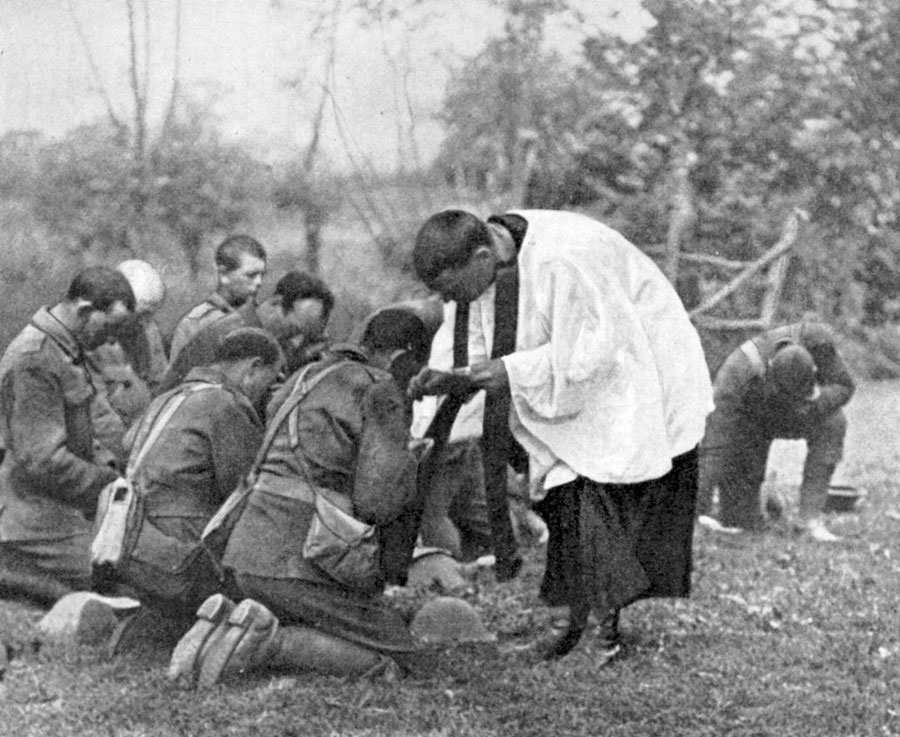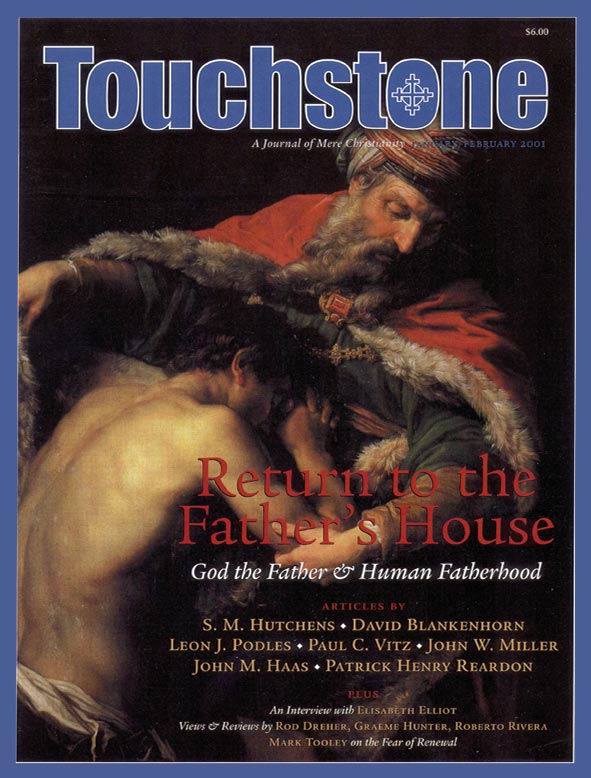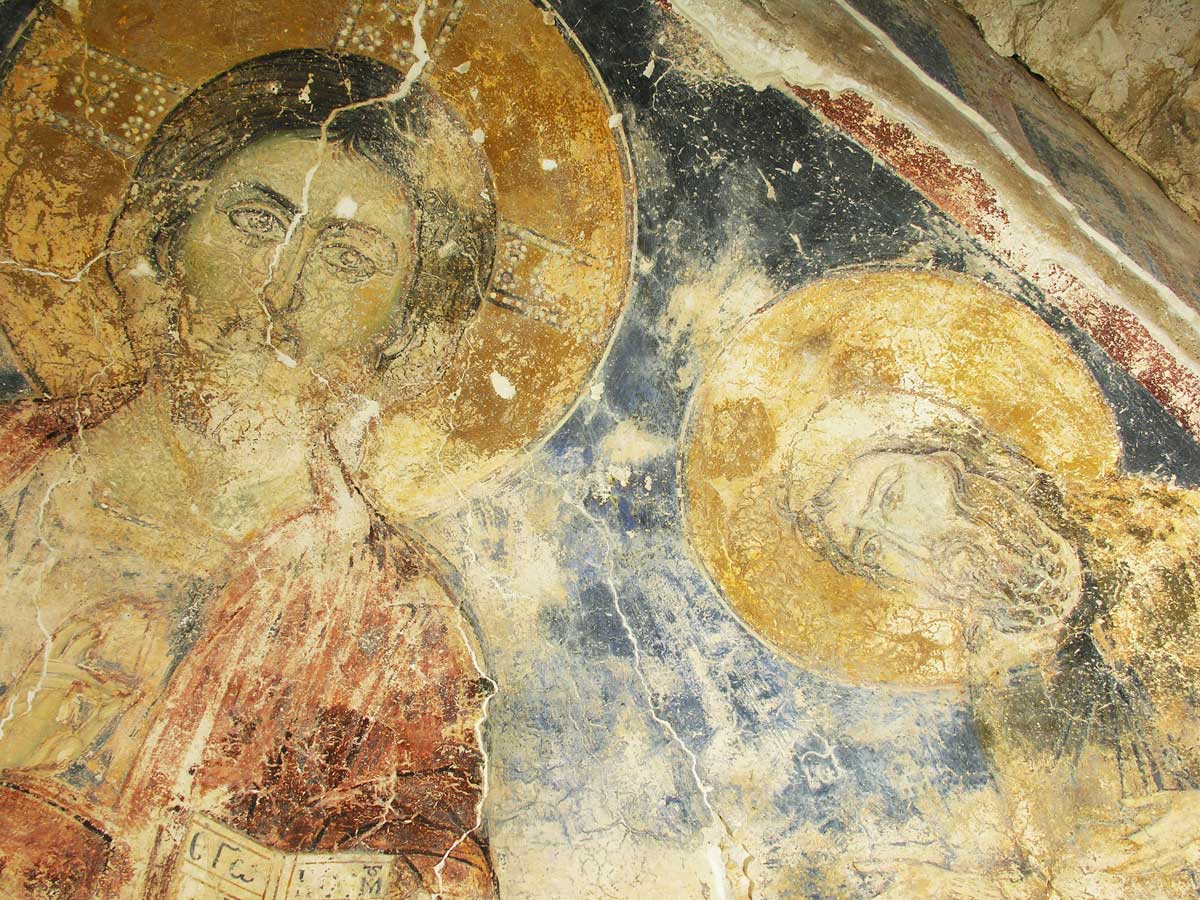Woman on A Mission
Elisabeth Elliot on Missions, Youth, Men & Women
Elisabeth Elliot (Mrs. Lars Gren), as a young mother serving as a missionary in Ecuador, became widely known when her husband, Jim Elliot, was killed by Auca tribesmen in 1956. She continued to serve as a missionary in Ecuador until 1963, eventually meeting her husband’s killers. Afterwards through her books recounting her husband’s sacrifice and her subsequent ministry to the Aucas, she became in wide demand as a writer and speaker.
Perhaps the best-known Evangelical woman in this country over the last 40 years, Elisabeth Elliot has traveled and spoken extensively, continuing to write books and a bimonthly newsletter (The Elisabeth Elliot Newsletter, Post Office Box 7711, Ann Arbor, Michigan 48107). She also has a daily radio program, “Gateway to Joy,” heard in 43 states and four countries.
The interview was conducted by Touchstone Executive Editor James M. Kushiner in March 2000 in Dallas, Texas, at a conference on the Christian Family sponsored by the Council on Biblical Manhood and Womanhood, at which Mrs. Gren was speaking.
Touchstone: I mentioned earlier that two of my daughters attended Wheaton College. Now I know that you attended Wheaton College . . . in . . . ?
Elisabeth Elliot (EE): . . . in 1944. I graduated in 1948. My grandfather and my father were trustees. Five out of the six of us went to Wheaton College—three out of my four brothers. I also had two aunts and an uncle who went there.
And you met Jim Elliot, your first husband, in college?
EE: Yes, he was actually my brother’s buddy on the wrestling team. My brother was a year younger than I and he was always saying to me, “You need to get to know this guy Elliot.” I thought, “I’m not particularly interested in my little brother’s friends.” So it wasn’t until late in the last semester of my senior year that we really got acquainted—Jim and I had almost the same schedule because we were both classical Greek majors.
Jim wrote in my yearbook just before I graduated, “A soldier on active service will not become entangled in civilian affairs. He must be wholly at his commanding officer’s disposal.” That’s 2 Timothy 2:4 from, I think, the J. B. Phillips translation. But that’s what Jim set his mind to do. He just went down the road like a thunderbolt to do what God wanted him to do. So, of course, when Nate Saint asked Jim if he would be willing to join him in a mission to the Auca Indians, it didn’t take Jim three seconds to make up his mind. He had been praying about the Aucas before he went to Ecuador. A missionary from Ecuador had told him about this one tribe that no one had ever succeeded in reaching and coming back alive. So Jim started to pray that God would give him the privilege of going to the Aucas. It’s in his journal several times: “God send me to the Aucas.”
Then you took to the mission field shortly thereafter?
EE: It wasn’t nearly as shortly as I’d wanted it to be. I was hoping to go to the mission field immediately. But I went to Prairie Bible Institute for one year and then I had different jobs. So it was four years before I ended up in Ecuador.
When did you sense a calling to become a missionary?
EE: From the time I was three or four years old, as far back as I can remember, I just hoped that God would let me be a missionary. Missionaries were my great icons.
One of the things that my parents were very good about was taking people in overnight and for meals. They were always hospitable. As kids, we had the tremendous blessing of sitting at the table and hearing missionary stories by the dozens.
So you were in Ecuador in 1952?
EE: From 1952 to 1963.
And when was Jim killed by the Aucas?
EE: In 1956.
I’m sure that it was quite a shock, certainly for you personally, but also to the Christians in this country at the time. Today we hear about so many Christians suffering around the world. Did it ever occur to you that we would see such persecution today?
EE: Oh no. It’s absolutely staggering.
It was said in the early Church that “the blood of the martyrs is the seed of the Church.” After Jim’s death what happened with the Auca tribe?
EE: Of course, we didn’t know if there would ever be a possibility of contacting the Aucas again, but it was by the providence of God that I had the opportunity to do that in 1957. I went to live with them for two years, which opened the door for many other people to work with the Aucas. Many of them became Christians; in fact, all five of the Aucas who did the killing became Christians.
There are huge changes taking place there now because 25 oil companies are drilling in what used to be considered the most beautiful virgin jungle in the world. This means that the Indians can no longer be hunters and gatherers. The rivers are being polluted and the trees are being knocked down, so they can’t continue to live like they used to. The only thing they can do, almost the only thing, is work for the oil companies, which is very tough because everything else—alcohol, drugs, prostitution—comes in. It’s tragic, but there are still some faithful Christian Aucas who sometimes preach to the outsiders and tell them the truth about the gospel, which is encouraging.
When you went to the Aucas in 1957, did you fear for your life?
EE: Of course, I never dreamed of going there, and I couldn’t imagine any way in which it could possibly work out for a woman with a baby to go in and live where five men had been killed. But it was obviously the providence of God that happened to put me in a place where I would not normally have been.
Two Qichua Indians—a very friendly tribe—appeared one day at a missionary’s home where I was visiting and said, “We’ve got two Auca women at our house. Do you want to come and see them?”
I had to make up my mind very fast because they said, “We left home when the sun was over here and the sun’s up here now and we’ve got to be home when the sun’s over here. If you come, you come with us now.”
So that’s the way it happened. I just set off down the trail with them on a six-hour walk and met two Auca women when I got there. Nobody could understand a word they said. We didn’t know why they had come; we didn’t know what in the world to do with them—but that’s a long story. They came and lived with me for almost a year.
During that year, I was able to learn enough of their language to know that they were telling me, “When that palm fruit gets ripe, we’re going home. And we want you to come with us.”
So I said, “Will your people kill me as they killed my husband?” They just laughed, put their arms around me, and said, “They’re not going to kill you. You’re our mother, you’re our friend.”
Do you still view yourself as a missionary?
EE: I don’t think I’ve ever thought about it in that way. God has given me influence in different ways. I began receiving invitations to speak as soon as I came back from Ecuador. I don’t know why, but I guess it was because I had written four books while I was still in Ecuador. If you write a book, people think you can talk.
So, one thing led to another, and I’ve been writing and speaking ever since then.
In the introduction of The Shadow of the Almighty, you asked some students, “Who are your heroes today?” Who would you say your heroes are?
EE: Corrie Ten Boom would be one of them. Amy Carmichael is my greatest icon of a missionary. I could also give a long list of great missionary women whom nobody knows: a woman in Africa that nobody’s ever heard of, Dr. Virginia Blakesly; another missionary, Mary Reese, was an English woman who went to a tribal group. When she met the chief at the threshold, he said, “If you step across that line, I’m going to kill you.”
“So,” she said, “over the line I went in the name of the Lord,” and lived to tell the tale. There are very many unsung, quiet, humble people who showed me what it is to be like Jesus.
From the examples you cite, it seems that a common trait was a certain amount of courage.
EE: Corrie Ten Boom is an example of tremendous courage. She would jump to her feet every morning when she woke up in her cell and start singing at the top of her lungs, “Stand up! Stand up! Stand up for Jesus!” so that everybody else in the prison could hear her. She had wonderful stories to tell.
I’ve been blessed by having very many godly Christians who were visitors in our home. My mother kept a guest book that has 42 countries represented. We six kids sat at the dinner table and listened to the hair-raising stories that missionaries had to tell us, and I wanted to be a missionary.
Do you view yourself as having, at least in part, a mission to young people on college campuses?
EE: Quite a bit, I think. It surprises me that any college kid wants to listen to an old lady. But I get a tremendous response. It’s amazing.
Could you tell us more about that?
EE: I’ve had wonderful experiences at the student Urbana Missionary Convention. I was there every year from 1972 to 1980. I had standing ovations every time from these kids even back then, and it’s even more so now when I have the opportunity to talk to young people.
About a year and a half ago we were at Clemson University in South Carolina where there were about 900 mostly male students—real jocks. I didn’t just get a standing ovation, but whistling, screaming, and stamping! All I did was talk for about fifteen or twenty minutes on sexual purity. I said, “Keep your hands off, keep your clothes on, and stay out of bed.”
Well, that’s straight talk!
EE: That’s what they’re looking for. It amazes me that they would listen to an old lady. It amazes me that they would listen to a woman at all. It’s still happening. There were kids flocking around me last night after they had the opportunity to talk to me.
Do you see in young people a deeper hunger today than, say, 20 years ago?
EE: I think so. I always have to refer to the five men in Ecuador because that has had a long-lasting influence. There have been young people whose lives have been changed by that story, and I have the feeling that there’s been quite a rise of interest in missions and in giving one’s life to God in the last five or six years.
You’re speaking at this conference, which is on the Christian family, sponsored in part by the Council on Biblical Manhood and Womanhood, an organization that is taking a very clear position against “egalitarianism.” In a number of the workshops, the issue of the headship of the husband has come up. That teaching wasn’t questioned when you were at Wheaton College or when I was growing up. Why do you think that it has become an issue and why is it so difficult for Christians nowadays?
EE: It’s very simple as to why it happened—it is the egalitarianism. It’s the whole idea that we’re all equal and it doesn’t make any difference who wears the pants or who makes the decisions. That’s obviously against what the Bible says—the woman is to be subject. It’s a great relief to me that I get to be subject. I don’t have to be at the top of the heap. The buck stops with my husband Lars, not with me.
It’s a relief? Certainly many today would not see it that way.
EE: It’s not easy for any of us—especially for a woman like me. I’m a hard-driving woman who wants to do her own thing and doesn’t want anybody to tell her what to do. But through the experience of having three very different husbands, God has taught me the blessing of submission—a great simplifier!
I’m very grateful that I have had the opportunity to speak to women on the subject and to help them to see that this is not because God hates you but because he’s giving you the joy and the blessing of not having to be the final answer. The husband is the one who has the tough job because he is the one who has to answer to God for what happens in the home.
What kind of reactions do you get when you speak on headship?
EE: Well, frankly, I don’t think anybody has asked me to talk about it for about 20 years. It was back in the 1970s that I was constantly being asked, and I got awfully tired of hearing it.
In the Bible it clearly says that wives must submit to their husbands. It is God’s mercy that put us there. We don’t have to take the solemn responsibility that you men have to take, and when women think that we all have got to be equal, they’re doing themselves great damage.
Now, it goes without saying that there are a lot of men who are wimps, and they don’t take the responsibility assigned to them. But God has to deal with them. I get letters from many women who live with men who are not Christians or men who are bums and do not have any interest at all in loving their wives as Christ loves the Church.
I think it is the most solemn and difficult assignment that’s ever been given to a man. Husbands have to love their wives as Christ loved the Church, which has got to be much harder than anything we have to do.
The hierarchy is visible in the godhead—the Father, the Son, and the Holy Spirit—all of them equal, yet the Holy Spirit witnesses to Christ, and Christ is subject to the Father. That is a beautiful and wonderful thing, and we ruin it to our great destruction when we refuse it.
We published an article by Huston Smith, in which he wrote that “Hierarchy was originally one of the noblest words,” having a “power that is suffused with holiness.” This idea has been destroyed in our culture. Hierarchy is now a bad word. I am curious to know why you haven’t been asked to speak on hierarchy, or if you will, headship since the 1970s.
EE: It was boring for me and, I supposed, for everybody else.
It’s not an issue for at least the groups that you address?
EE: I wouldn’t say it’s not an issue. They don’t ask me to talk about it. Sometimes in the question-and-answer period following my talks, those issues will come up, but unfortunately I have failed to study them thoroughly—I must do better!
What are some of the other issues that you often talk about?
EE: Try to learn to see Christ in your husband—treat him as you would treat Jesus! The Bible says that we are to “give thanks always and for everything.” Another topic is: “Choose your attitude.” We have the power to choose our attitudes. We don’t have to be distant or bored or snotty. Such are principles from the Scripture and I don’t like to get into current issues more than I have to.
In an interview that we did with your brother Tom (Howard) in Touchstone, he said that women don’t dash around creating things because they “know in their bones” something about being human already, while men are “perplexed about life” and they’re trying to figure it out. What do you think about that?
EE: Well, that’s Tom’s brilliancy. I wouldn’t be able to think of it in that way. He’s eight years younger than I, and I’ve often said I taught him everything I knew when I was ten years old and he’s been teaching me ever since. He’s a genius, there’s no question about it. But I like that statement and I agree.
Could it be that men are essentially irresponsible louts and need to be assigned a position or be given an office so that they know exactly what’s expected of them, and then they will do their duty? Women are always pitching in—they always see what needs to be done and just do it. I don’t know if that would agree with your experience.
EE: Yes, very much so.
That’s one of the reasons I think men are supposed to be given office. I see that in Scripture, too. The men were appointed (e.g., the Seventy and the Twelve Apostles). The women were always there ministering and were there even at the Cross, but they were never given a specific office as such. I think it’s just in the nature of men that we have to be told, “Here’s your uniform. This is your job.” Then we say, “Yes sir, I’ll do it.”
EE: That’s very good. I like that.
Do you see any benefits that have come from feminism or feminist thought?
EE: I don’t think I have ever thought of anything that was useful from that.
Nothing?
EE: Nothing comes to mind. I major on femininity. My mother set a beautiful example.
What about “equal pay” and all that sort of thing?
EE: The feminist movement has taken so many women out of the home, which is a great tragedy. Women belong at home and when the husband wants his wife to go out and get a job, of course she has to submit to her husband. But what is happening to the kids? These latchkey children break my heart.
My mother was asked one time, “What did you do besides raise your children?” She didn’t know what the person was talking about. She thought, “What did I do? What else was I supposed to do?” She raised six children!
A woman who heard her say that said to me, rather pityingly, “So your mother didn’t have a life, did she?” To which I said, “My mother wouldn’t have the foggiest notion what in the world you were talking about if she ever heard you say that.”
We were her life. She didn’t want anything else. My mother never taught Sunday school and never got involved in the civic things in the town. She was home when we came home from school. All we wanted to know was that mother was there. We banged the door open, threw our books down, and tore out the back door to play. But in the meantime, we yelled, “Mother, we’re home!” and she was there. Today, many parents don’t know what their children are up to and don’t care.
Before I leave, could I ask what are some books that you would recommend?
EE: Tom is the one who tells me what to read most of the time, but I learned of the writings of Amy Carmichael when I was 14. She wrote more than 40 books. She has greatly helped to shape my vision. We read all the old books. I love books like de Caussade, St. Francis de Sales’s Introduction to the Devout Life, and the writings of Madame Guyon. I’ve got shelves full of them, but my mind goes blank at the moment. C. S. Lewis had a rule: “Read three old books before you read one new one.” I think my father said pretty much the same thing to us: “Read the old books.” He read Matthew Henry and Charles Spurgeon.
And what books would you recommend to people in their twenties or thirties?
EE: Of course, I’ve written some books that I want the young people to read: Passion and Purity, Quest for Love, The Shaping of a Christian Family, The Mark of a Man, Let Me Be a Woman.
I’m alarmed at how long it’s taking men to buckle down and get married. When my grandfather graduated from the University of Pennsylvania—he was 21—he graduated from college, got a job, and got married. All three things in the same year, and that was routine—it was taken for granted.
Nowadays, men are bungee jumping, hang gliding, scuba diving, and spending a whole lot of money on the weekends. They’re never at home because they work five days a week and play on Saturday and Sunday. They’re playboys and they don’t seem to think about settling down and having a family until they get to be forty.
Then, all of a sudden, what do they do? They pick out the twenty-year-old girls, and they leave all the women of their generation behind. I get tragic letters from fine, godly women who are getting up into their thirties and forties. Where are the men? Hang gliding and bungee jumping. Paul said, “When I became a man, I put away childish things.”
James M. Kushiner is the Director of Publications for The Fellowship of St. James and the former Executive Editor of Touchstone.
subscription options
Order
Print/Online Subscription

Get six issues (one year) of Touchstone PLUS full online access including pdf downloads for only $39.95. That's only $3.34 per month!
Order
Online Only
Subscription

Get a one-year full-access subscription to the Touchstone online archives for only $19.95. That's only $1.66 per month!
bulk subscriptions
Order Touchstone subscriptions in bulk and save $10 per sub! Each subscription includes 6 issues of Touchstone plus full online access to touchstonemag.com—including archives, videos, and pdf downloads of recent issues for only $29.95 each! Great for churches or study groups.
Transactions will be processed on a secure server.
more from the online archives

35.4—Jul/Aug 2022
The Death Rattle of a Tradition
Contemporary Catholic Thinking on the Question of War by Andrew Latham
calling all readers
Please Donate
"There are magazines worth reading but few worth saving . . . Touchstone is just such a magazine."
—Alice von Hildebrand
"Here we do not concede one square millimeter of territory to falsehood, folly, contemporary sentimentality, or fashion. We speak the truth, and let God be our judge. . . . Touchstone is the one committedly Christian conservative journal."
—Anthony Esolen, Touchstone senior editor









